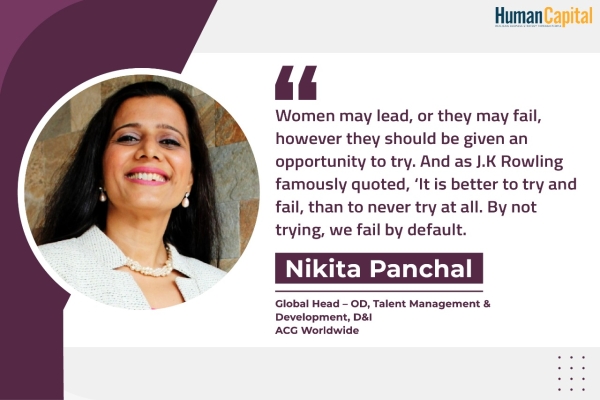Gender inclusiveness in the workplace has long existed with women being relegated to the back burners, but, times are changing and women are strong contenders for leadership positions.''
Imagine a world where every thread in the yarn knows that it has an equal space, every colour shines to its glory on the canvas and every tree in the forest knows about its co-existence and interdependence. If nature does not need a reminder to embrace diversity then what makes humans dial down as we organise our reality?
The topic of women in the workplace has been often written about. The typical information given out generally revolves around creating more balanced workforces by employing a larger number of women. This could stem from actually being serious about the importance of diversity and inclusion, and also simply because inclusion is an agenda, not a goal. However, let us delve more into aspects beyond the obvious and take a deeper look at why organisations choose to hire women as part of their workforce. Enough has been spoken about the importance of women empowerment and creating a space for women, however, when it comes to the real impact, be it socioeconomic or psychological impact, where do we really stand as a part of the modern-day workplace?
As per a Forbes report, industries where women are largely represented, like retail, education, travel and hospitality, have unfortunately been hit hardest by the pandemic. This accounted for almost 61% of the jobs that were furloughed. A great contribution to this has been because women do not just make up a large part of these industries that were hit badly, but also that women hold such jobs that can be easily laid-off or targeted first. This demographic became more discernible due to COVID-19, but it only reiterates the fundamental fact which we have always taken for granted, that when it comes to taking responsibility or suffering consequences, women mostly bear the brunt. A popular term was coined owing to the large degree of job losses women faced during the pandemic, called “pink recession”, which in a way means the pink-collars mostly being handed over the pink-slips.
Now, we can get into the anatomy with the “Why’s”. The answer lies in the fact that losing jobs can be a part of the effects of the pandemic which has affected those who lost their jobs. However, the lack of modification of the age-old equation of underrepresentation of women in significant roles and over-representation in ancillary roles in most workplaces is most concerning. Times are certainly changing, but when it boiled down to the socioeconomic impact brought in by the once in a generation crisis like the pandemic, the ones who bore the brunt were women.
Despite the added exhaustion due to the pandemic, women are taking on extra work, and are also doing more to support their teams and enhance efforts at diversity, equity and inclusion. Yet, their critical work and immense contribution is going unrecognised and that has concerning implications.
Hence, balancing the equation and improving the dangerously low fractions in terms of women’s advancement is the need of the hour. Advancement in terms of cerebral equality, in terms of the freedom to fail, making honest mistakes and being given the same treatment as their male counterparts. There are some fundamental shifts we need to create a space for women in workplaces.
Outsider to Insider
As per a recent study within our own organisation where we were trying to understand the current reality when it comes to diversity and inclusion, we studied the patterns where associates were made to feel like insiders or outsiders. It was hardly surprising that many women felt they were outsiders, maybe just because they were women. They were in roles that were not critical, and did not let them into the inner circle and did not provide career growth, or else they felt outnumbered as women in traditionally maledominated roles.
In fewer cases, women of colour also felt outnumbered, while almost all women expressed that they failed to decipher the difference in treatment. According to them, they were doing more work, working at home and raising kids. Then, why did they feel the gap or the evident feeling of not being an insider? For women, being an insider should not be when it comes to handling domestic chores like managing the monthly groceries or maintaining the house or supporting/traditional lower or mid-level roles in the corporate sector. While stating this, we are in no way discounting the need for a well-maintained home. However, this calls for creating roles and appointing women to roles where it is not seen as just exemplary, but normal responsibilities that can be performed by any competent human being. In short, gender should not be the deciding factor, rather competence and experience should be what makes people suitable for certain roles within an organisation.
From support to power
Creating opportunities beyond the stated barriers is important to help bridge the gender divide. How would it be if more women associates could curate career journeys for their personal group, which includes access to nonconventional exposure, access to resources, inclusion in role evaluation, conversation and recreating new norms for inclusion? Organisations need to do a role study to understand the present role biases that prevail within the organisation and then take systemic action to bring in more access for women employees and build openness. Women may lead, or they may fail, however, they should be given an opportunity to try. And as J.K Rowling has famously quoted, “It is better to try and fail, than to never try at all. By not trying, we fail by default”.
Addressing the reservations When it comes to reservations, we need to first understand how women feel about these reservations? Have women expressed reservations on what they can or cannot do, or would or would not do? No, it has been a systemic deduction of age-old beliefs which we never cared to correct. Reservations label the person as a diversity candidate, challenge credibility, and further increase the entry barrier. Yes, it might provide access, but it surely increases the probability of a whole system of rejection hence being counterproductive for the very purpose it has been introduced. The answer to reservation is improving accessibility, creating opportunities, shaping minds to reduce stereotypes, re-engineering systems and processes to eliminate old patterns and preferences, and most importantly, to reduce labelling.
Stereotyping began and became so ingrained that now we are fighting to create better workplaces and opportunities for women which should have always normally existed. In a study of about 2300 odd associates in our organisation, we found about 85% women associates to be in roles which were administrative in nature and more such roles being taken by women. Letting women evolve in the process, creating an unchallenged affinity towards the career choices that they would like to take up should be the goal of today’s workplaces. If only we could create a space without reservations, we would not have the outlying cases of “Women Service Engineers” or “Women Leaders” any longer; it would only be engineers and leaders.
He/She/I Last but not the least, it is about merit. While we create jobs and opportunities, how can we not fall prey to the “Similarity attraction phenomenon”? When there is a growing dialogue in terms of having more representation in the workplace, why are we not seeing the right numbers when it comes to marginalised groups? Similarly, the attraction phenomenon only explains that as human beings we tend to be more attracted to beings who share similar attributes as us, be it at the surface level (race, age, gender identity, age-group, etc.) or at the deep-level (shared values, beliefs and attitudes). This leads to different biases which impacts marginalised groups in the workplace. The next time we hire anyone, or are doing a performance rating or mentoring anyone, let us try to be conscious and take note if we are yet again falling into this trap and let us try and look at merit above any other attribute.
As we inch closer to International Women’s Day, let us make a small promise to create spaces for more women in our industries. A space where there is freedom to take on challenges and not be told what to do. Let us think beyond normalising rare achievements and ask all women this question by Sheryl Sandberg, “What would you do if you weren’t afraid?”
Does your organisation support you in maintaining work-life boundaries?
Trending
-
SBI General Insurance Launches Digital Health Campaign
-
CredR Rolls Out 'Life Happens' Leave For Its Employees
-
Meesho Announces 30-Week Gender-Neutral Parental Leave Policy
-
Microsoft Unveils Tech Resilience Curriculum To Foster An Inclusive Future
-
60% Indian Professionals Looking For Job Change Due To COVID: Survey
-
SpringPeople And Siemens Collaborate For Digital Transformation Push
-
86% Professionals Believe Hybrid Work Is Essential For Work Life Balance: Report
-
Almost 1 In Every 3 People's Personal Life Affected Due To Work Stress
-
Meesho Rolls Out Reset And Recharge Policy For Employees
-
80% Of Talent Leaders & Academics Say Pandemic Changed Skill Needs For Youth: Report
-
Hero Electric Rolls Out 'Hero Care' Program For Employees
-
Human Capital In Collaboration With ASSOCHAM Hosts Virtual Conference
-
IKEA India, Tata STRIVE Collaborate To Create Employability And Entrepreneurship Opportunities
-
SAP India, Microsoft Launch Tech Skilling Program for Young Women
-
DXC Technology, NASSCOM Collaborate For Employability Skills Program
-
Lenskart To Hire Over 2000 Employees Across India By 2022
-
Mindtree Launches Learn-and-Earn Program
-
Tata AIA Extends 'Raksha Ka Teeka' To Its Employees
-
Swadesh Behera Is The New CPO Of Titan
-
NetConnect Global Plans To Recruit 5000 Tech Professionals In India
-
Hubhopper Plans To Hire 60% Of Indian Podcasters By 2022
-
Corporate India Needs More Women In Leadership Roles: Report
-
Aon to Invest $30 Million and Create 10,000 Apprenticeships by 2030
-
Tech Mahindra Launches ‘Gift a Career’ Initiative for Upskilling of Youth
-
40% Women Prefer Flexible Working Options in Post-COVID World: Survey
-
3 out of 4 companies believe they can effectively hire employees virtually: Report
-
Vodafone , CGI and NASSCOM Foundation launch digital skills platform
-
Odisha: Bank, postal employees to deliver cash for elderly, differently-abled persons
-
Skill India launches AI-based digital platform for "Skilled Workforce"
-
Hiring activity declines 6.73% in first quarter: Survey
-
70% startups impacted by COVID-19 pandemic
-
Bajaj Allianz Life ropes in Santanu Banerjee as CHRO
-
Over 70 Percent MSMEs look at cutting jobs to sustain businesses
-
93 Per Cent employees stressed about returning to office post-lockdown
-
Johnson & Johnson India announces family benefits for same gender partners
-
Indian firms turning friendly towards working mothers
-
Welspun India names Rajendra Mehta as new CHRO
-
Wipro partners with NASSCOM to launch Future Skills platform



Human Capital is niche media organisation for HR and Corporate. Our aim is to create an outstanding user experience for all our clients, readers, employers and employees through inspiring, industry-leading content pieces in the form of case studies, analysis, expert reports, authored articles and blogs. We cover topics such as talent acquisition, learning and development, diversity and inclusion, leadership, compensation, recruitment and many more.
Subscribe Now












































Comment